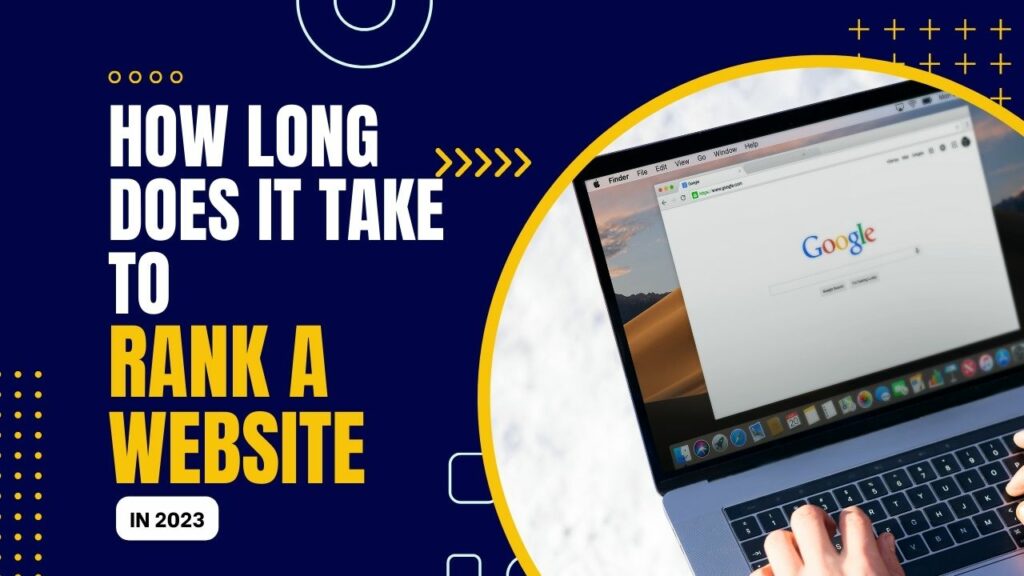 One of the best ways to make your business or your website visible to your target market or audience is by making it to the top results in a search engine, like Google Search. Once you have optimized your website’s relevance and visibility, you may find yourself checking its Google rank already. In this article, we will answer your question: “How long does it take to rank a website?”
One of the best ways to make your business or your website visible to your target market or audience is by making it to the top results in a search engine, like Google Search. Once you have optimized your website’s relevance and visibility, you may find yourself checking its Google rank already. In this article, we will answer your question: “How long does it take to rank a website?”
What Does it Mean to Rank in Google?
When you have your website already appearing on the search engine results pages or SERPs when users try to search using specific keywords or phrases, this means that your website already ranks in Google.
Some complex algorithms help Google determine your website’s relevance and quality based on user search queries. This means that when your website has a high rank on Google, it appears in one of the top search results. Getting your website a high rank in Google is good, this means that your website has more visibility, and is attracting organic traffic.
Getting a higher ranking on Google is one of the most important goals of businesses and individuals. Because it impacts your website traffic, your website’s exposure, and potential customers.
Why is it important for your website to rank in Google?
When users use Google to search the internet, they will be shown a lot of results. Being able to make it to the top results in Google Search and other search engines means a higher chance of your website being visited.
Most of the time, users only check the first page of Google results. And more often than not, these users only check the first three or five results. This is why your goal should not only be to rank in Google but to be in the top 5 in search results.
You might also like: 8 Steps on How to Rank Your Website on Google First Page
How long does it take to rank a website in Google?

There is no specific answer to the question, “How long does it take to rank a website in Google?” The time it takes for websites to rank is affected by several factors.
It may take time for your website to establish an online presence. You will also need to build your website’s authority. You may see improvements in your website’s ranking on Google after a few weeks or months. But there is also a chance that it may take several months, or even longer than that.
The factors that affect the time frame include the following:
- Competitiveness of the industry
- Keywords targeted
- Your website content’s quality and relevance to user search queries
- The technical optimization of your website
- The SEO strategies you use and their effectiveness
- Your website’s backlink profile
Factors that affect your website’s rank
There are several factors that highly affect your website’s performance when it comes to ranking in Google. These factors do not only affect your ranking but can also affect how long it takes for your website to appear on the top search results.
1. User Metrics
User metrics are one of the most important factors that affect your website’s ranking. Most websites with competitive user metrics see improvement in their Google Search ranking within a few months.
When talking about user metrics, we are talking about several factors, but it’s mostly about whether or not people visit your website. We are listing the basic user metrics you have to improve to get a higher rank in Google Search.
The basic user metrics:
- Page views. These are the number of page views on your websites. The views are counted based on the pages viewed on your website. If a visitor views your website’s first page and checks the second one, then each of them gets one view. If they go back to the first page, then it gets 2 views in total.
The higher the number of page views your website gets, the higher the chance of your website ranking in Google. This implies that people are seeing your content and they find it relevant and useful.
- Total traffic. This metric is the total number of people that visit your website. It includes visitors from various channels such as social, organic, direct, as well as referral.
- Bounce rate. Your website’s bounce rate is the percentage of visitors who leave your website after viewing only one page. The higher your bounce rate is, means that people do not find your website interesting or valuable. So making sure that your website has a low bounce rate means that you have a higher chance of getting a better rank in Google Search.
Here is the benchmark for the bounce rate:
-
- 10%-45% bounce rate: Excellent
- 46%-65%: Normal
- 66%-75%: Poor
- 76% and up: Concerning
On the other hand, a 9% or less bounce rate may need some investigation on the website.
- Pages per session. This is the average number of pages on your website that were viewed by a visitor in one session. Please keep in mind that one session is equivalent to a 30-minute page activity.
- Scroll depth. This measures how far a visitor scrolls on your page. If your website has a high scroll depth, it means that your page visitors are interested in your website’s content.
- Time on site or page. This simply means how long your page visitors spend on your website.
2. Domain Popularity
Your domain popularity is the level of recognition and trust your domain has gained over time. This is also the number of backlinks coming from other domains that refer back to your website.
3. Links
Links are one of the most important factors that affect your website’s ranking in search engines. The higher the number of links you get to your website, the higher the chance it gets to rank in Google.
4. Site Design
It is also important to consider your website’s design if you want to get a high rank on Google Search. This includes fast loading times, mobile responsiveness, secure browsing, and easy navigation for your visitors.
5. Age of the Ranking Page
Older websites tend to have higher rankings on Google. This is because these pages have already established popularity, credibility, and reliability. Google will trust websites that are already established and reliable enough in providing information to visitors.
6. Competition
Aside from making sure your website has high-quality content, it is also important to know your competition. The more competitors you have means that it will not be easy to get a high rank on Google.
We recommend that you research first who your competitors are, how they are doing with their rankings, and the keywords where they rank higher in search engines.
7. Website or Domain Authority
Google also considers your website’s authority in determining its ranking. Your domain authority is affected by several factors including your domain age, website engagement, social signals, and brand reputation.
You might also like: Page Ranking Tips and Tricks: How to Check the Rank of a Website
What Can You Do to Get Your Website to Rank Better on Google?

1. Make sure your website is HTTPS
It is important that your website is HTTPS (Hypertext Transfer Protocol Secure). This provides your visitors’ browsers with a secure connection to your website.
To enable HTTPS on your website, you need to get an SSL/TLS certificate. In doing so, you are enhancing data security between your website and your visitors which will gain their trust. This also helps in SEO as Google considers this as one of the factors in determining your website’s ranking.
2. Create high-quality content
Original, high-quality, and relevant content that meets the needs of searchers contributes to your website’s ranking. By creating high-quality content, you will be able to attract more traffic and engagement. This will also help you in establishing your domain’s popularity and authority.
3. Seek a reliable and credible SEO agency
If you are not knowledgeable in search engine optimization or SEO, you might want to try looking for a reliable and credible SEO agency to help you with your SEO strategy.
4. Gain high-quality backlinks
Backlinks refer to links that direct visitors to your website. When a good number of trusted sources link your website, Google will give credit to your domain.
5. Check your site speed
One of the most important factors that will help you get a better rank in Google is by checking your site speed. The faster your website is, the higher the chance your website will rank on Google Search.
6. Make sure your site is user and mobile friendly
If you want your website to reach a bigger audience, we recommend that you make sure it is mobile-friendly. With the technology today, people use their phones more often to search the internet. In fact, more than 60% of searches come from mobile devices like phones and tablets.
7. Be patient
As we mentioned above, there are several factors that affect your website’s Google Search ranking. Each factor is relevant and also affects how fast your website gets into the top search results. Though SEO helps a lot in improving your website ranking, it may take time to see improvement. So be patient, while you work on other ways that help speed up the process.
Frequently Asked Questions
How long does SEO take to rank?
It is not easy to give an answer to this question. This is because the time it takes for SEO to help your website ranking depends on several factors including:
- Competitiveness of the industry
- Keywords targeted
- Your website content’s quality and relevance to user search queries
- The technical optimization of your website
- The SEO strategies you use and their effectiveness
- Your website’s backlink profile
How long does it take for backlinks to kick in?
There are several factors that affect the time for backlinks to kick in. Remember that backlink alone will not be able to improve your website’s Google Search ranking, so it’s important to also focus on other factors.
Here are the factors that affect the time for your backlinks to kick in:
- Crawling and Indexing. Once different resources link to your website, Google would need to discover and crawl that page first. Google’s frequency and timing in crawling can vary, so it may take some time to index the resource and recognize the backlink.
- Link Velocity. This refers to the rate at which your website acquires backlinks. If your website suddenly gets a high number of backlinks, this may appear as a red flag for Google. We recommend that you build backlinks naturally and gradually.
- Authority and Relevance. When acquiring backlinks, it is best that it comes from reliable and credible sources or websites. This way, Google will detect the relevance of your website. The more backlinks you get from relevant websites with authority, the higher it positively affects your ranking.
- Competitiveness. If your website niche is highly competitive, you will need more effort and time. This is because the more competitors you have, the more options for other websites to link in their content.
How much does SEO cost in 2023?
The cost of SEO will depend on the package you avail. Here are the average costs:
- Monthly – $500 to $1500 per month
- Hourly – $75 to $100 per hour
- Project-based – $2,500 to $5,000 per project
You might also like: Voice Search Optimization: How AI Can Help Improve Your SEO





